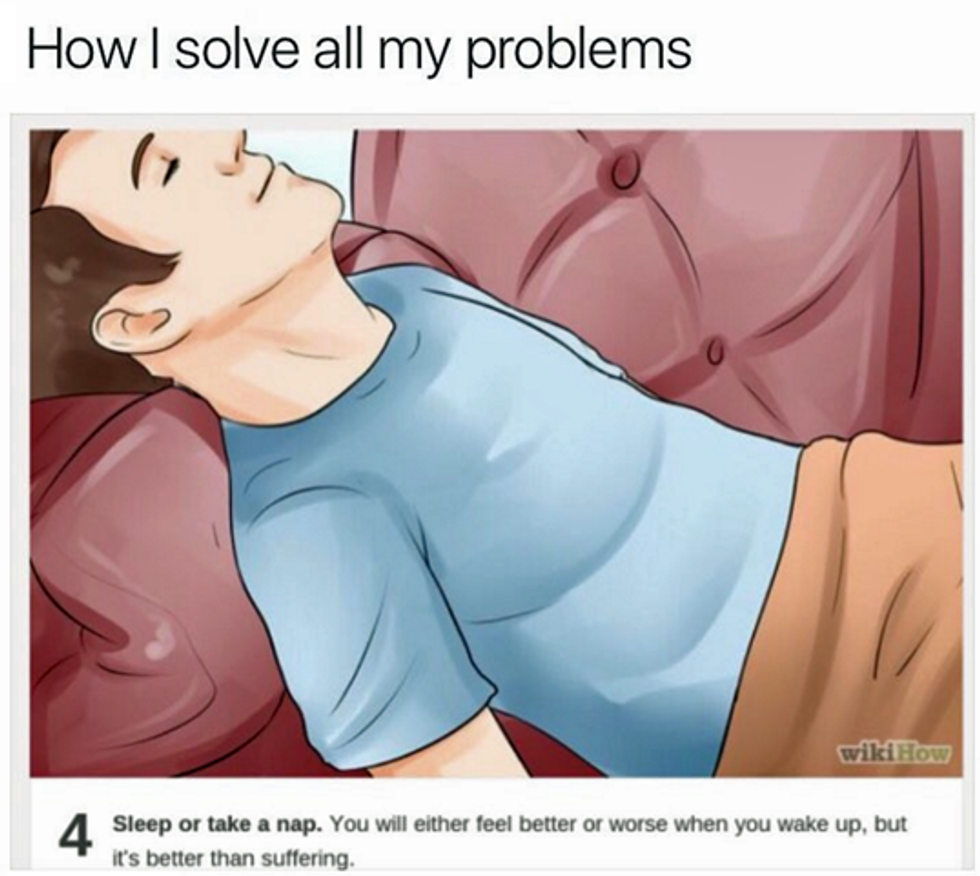If I was a superhero, I'd probably call myself "Captain Narcolepsy." Even as a little girl, my ability to fall asleep at any time (and any place), combined with my love for actually being asleep, was always incredibly helpful, as I'm sure my mother would agree. But, as I grew older, my special snoozing talents helped me counteract the terrible, completely unhealthy sleeping schedule that I and many other high school and college students have now come to accept as "the norm." Without a doubt, my sanity has been saved by the power of one thing and one thing alone: the nap.
You might be thinking to yourself: "Napping? Surely she can't be serious. Napping can't help improve my life in one simple step! This is an outrage!" But I promise it's true! Time and time again, naps have been scientifically proven to not only restore alertness and enhance performance, but also reduce stress and boost the body's immune system. Not only that, naps have been shown to increase memory retention as well, so remember that the next time you're debating if pulling an all-nighter before a test is really worth it.
Of course, I realize that not everyone is as lucky in the sleep department as I am. It can sometimes be quite difficult to will yourself to nod off for a bit when your mind is racing with all the work you need to do, or perhaps the noise levels around you make sleeping even for a few minutes almost impossible. Fear not, for I have compiled my top napping tips together below that will take you from 'sleepy loser' to 'happy snoozer' in no time at all. So get comfortable, dim the lights, and prepare to awaken all your deepest desires to doze. Your mind, body, and mood will thank you for it!
Firstly, you need to time your nap just right, in order to both maximize the benefits and also avoid any extra grogginess that will counteract precisely what you're trying to accomplish. There are a few ways to do this: this fun nap wheel will tell you the perfect time for you to take a nap based on when you woke up, incorporating your body's natural tendency to "slump" in the afternoon into the equation. In addition to timing the nap, the duration of the nap will also affect your body in a variety of ways.
For example, the traditional "power nap" is generally 10-20 minutes in length, and can help boost energy and alertness. A longer nap of around 60 minutes can help improve the remembering of names, faces, and facts, however, there is some risk of a bit of a groggy wake-up. Finally, the ultimate nap clocks in at around 90 minutes, boosting creativity, energy, and memory, and constitutes a full sleep cycle (both lighter and deeper stages of sleep, including REM) which makes it easier to wake up. Any nap over 90 minutes risks the potential side-effects of too much napping, which confuses your body and usually results in a lasting tired feeling that can really throw you off.
If you really want to maximize your nap effectiveness, try drinking some coffee right before you go to sleep. It sounds a little counter-intuitive, but sneaking in some rest before the caffeine hits your system is actually proven to help you wake up more refreshed and energized when compared to non-caffeinated naps. However, depending on how caffeine-sensitive you are, the coffee nap isn't necessarily for everyone, so experiment with that as you see fit.
Now that you've figured out how to correctly time your naps, your snoozing environment is the next area that deserves some attention. Try to find a comfortable, quiet place to unwind for a while, keeping in mind your own personal preferences that will boost your nap even further and make it easier to fall asleep (such as temperature, clothing, bed/couch preference, etc.). Carving out a chunk of your day that you can consistently nap during will help not only incorporate your nap into your weekly schedule, but also make it easier to control your sleeping environment.
For me, I take a 90 minute nap at the same time every Monday, Tuesday, Wednesday, and Thursday: as soon as I get home after class (around 4 P.M.) until my suite-mate decides to get dinner (sometime around 5:30 P.M.). My roommates know that I will be asleep during those times, and so, the likelihood of them being too loud, or even coming into my room to ask for something, is greatly diminished, simply because they know what to expect and to be mindful. Setting up a similar system in your own schedule can help make your naps better and more effective, reducing noise levels and decreasing any potential disruptions from your precious time away in dreamland.
Sometimes, the hardest part of taking a nap is getting yourself to fall asleep. Turning off the brain is a tricky business, but there are definitely some supplemental things you can do to fall asleep faster, such as the "4-7-8" breathing pattern (inhale for 4 seconds, hold your breath for 7 seconds, and slowly exhale out of your mouth for 8 seconds), or even simpler things, such as making the temperature of the room cooler, or even just putting on socks. Don't forget to set an alarm, though! This reduces any anxiety you might have about waking up on time, and also helps control for how long your nap should be, depending on what you want to get out of it (as mentioned above).
Incorporating naps into your weekly schedule will absolutely improve your life, and hopefully some of the tips I've given can help make your napping experience all the more rewarding. Keep in mind, napping is a different experience for everyone, so finding out how your body works best with both timing and sleeping conditions is the key to planning the most effective and enjoyable nap you can have. And just remember: when in doubt, nap it out!






















